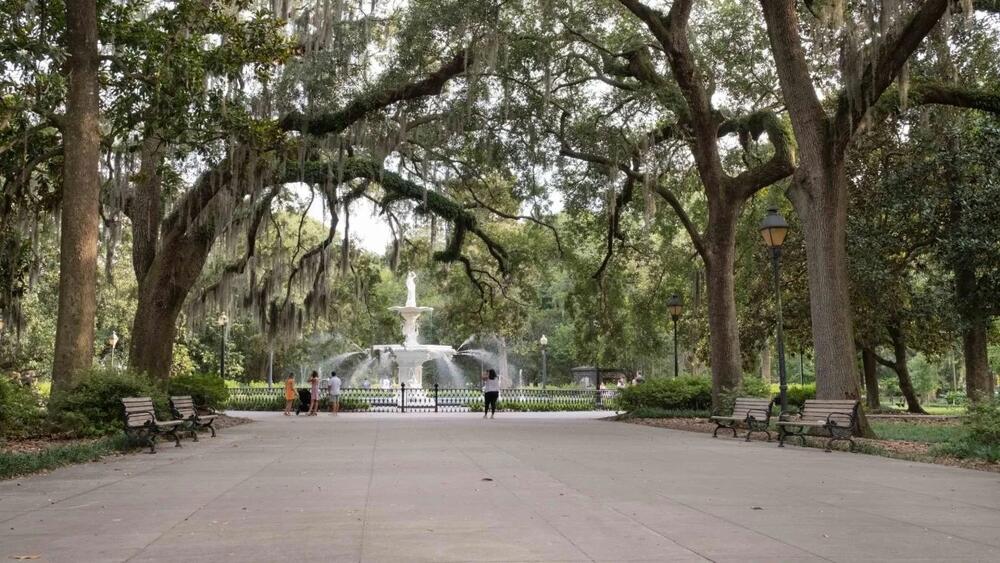
Caption
Forsyth Park in Savannah, Ga., has been the backdrop for over 14 films, including "Cape Fear" (1962), "The Gingerbread Man" (1998) and "The Underground Railroad" (2020).
Credit: Justin Taylor / The Current

Forsyth Park in Savannah, Ga., has been the backdrop for over 14 films, including "Cape Fear" (1962), "The Gingerbread Man" (1998) and "The Underground Railroad" (2020).
Savannah’s city council is set to approve Thursday a revised agreement with a private philanthropic group dedicated to raising money for Forsyth Park that still maintains the municipality’s oversight over enhancements to the iconic green space.
The memorandum of understanding between the City of Savannah and the Friends of Forsyth Conservancy, Inc., was pulled from council consideration last summer after reporting by The Current revealed controversial provisions in the document. These included allowing private donors to use the public park for free for their own events, while also shielding the identities of donors and not outlining any specific sums of money that the conservancy would need to raise for the park.
The prior version of the agreement also codified the so-called Forsyth Master Plan as the binding document for changes to the park.
In the updated agreement, however, those controversial issues have largely disappeared. The document now describes the conservancy as the “main” organization, rather than the sole group, able to provide philanthropic funding for Forsyth and refers to the master plan as a “guiding” force, not a binding document. The new MOU also specifies that the city has final say over planned investment projects and describes a work process by which the director of the city’s Park and Tree Department and the conservancy would discuss and approve priority projects each year for the 10-year partnership.
“The City and the Conservancy will work collaboratively to develop mutual priorities for which the Conservancy will support the City,” according to the MOU.
The planned agreement is the latest step in the process started in 2021 by the Trustees’ Garden Club, a private group of Savannahians who wanted to ensure the future of Forsyth Park, including the health of its tree canopy, its historic preservation and the safety of those who use the green spaces for recreation. The group spent tens of thousands of dollars on landscape architects to develop a master plan, an effort that sparked deep civic conversations and concerns among tens of thousands of city and county residents.
Club and conservancy members have likened their efforts to private-public partnerships common across America — like booster clubs that raise money independently for a public cause — similar to the conservancy that oversees New York City’s Central Park.
Others in Savannah have looked skeptically at the efforts, seeing it as an example of wealthier white residents dictating how a public space that benefits low-income and Black residents should be used. Meanwhile, other nonprofits that previously raised money for Forsyth’s children’s playgrounds or worked to support the local bird populations felt shut out and ignored.
The latest version of the MOU mandates that representatives from the Victorian and Downtown Neighborhood Associations, which border Forsyth, as well as the city’s parks department will have representation on the conservancy’s 22-member board. The conservancy is a foundation that includes Trustee Garden Club members dedicated to the Forsyth project.
The MOU details a balance of power between the city and the conservancy which recognizes that the group provides an “additive” budget for project funding at the park. The agreement states that the municipality would have the right to veto any project presented by the group. “The Conservancy’s fundraising and expenditures begin with a commitment it shares with the City of Savannah: to preserve and enhance Forsyth Park and to advocate for the preservation of the historic integrity of the Park,” the document states.
Meanwhile, the MOU reserves the right for the conservancy to use Forsyth for fundraising events, without paying the city for security, preparation or cleanup costs. However, the provision that would have allowed the group to plan and hold private events on the city’s dime at the park has been excised from the agreement.
The new MOU appeared to have addressed community concerns about the identities of potential donors to the conservancy by codifying procedures for the city to receive lists of funders from the conservancy each year. The conservancy still plans to keep the members of its organization and donors private as applicable by law, but the agreement also states that the city is subject to Georgia Open Records Law, indicating that communications between the group and municipal officials could be as well.
This story comes to GPB through a reporting partnership with The Current.